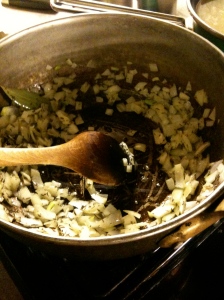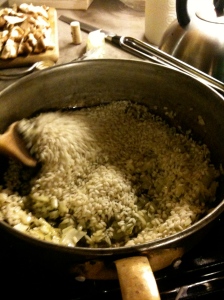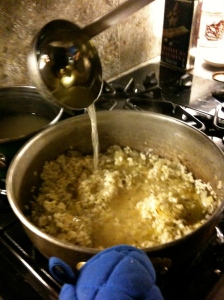Recipe # 15: cherry tomato pasta
Recently Luca was reading the National Geographic magazine and misread a sign in a photo of a Western landscape. Instead of “for your enjoyment,” he read “for your annoyment.” When he realized his mistake he cracked up laughing and now he gets a big giggle out of saying “for your annoyment” whenever he can fit it into the conversation.
On the day he made the cherry tomato pasta from Fanny at Chez Panisse, Luca was suffering from a low grade, generalized annoyment and didn’t feel like cooking. I was tempted to make light of it by reminding him of his new favorite word, but he was in no mood.
He was constructing something out of Legos (a battle station? a droid planet?) and when I asked him if he wanted to go ahead with the recipe he had picked out, he snapped at me: “I’m doing something!” I assumed that things would only go downhill from here and that we’d be scrapping the idea of Luca making dinner. But then he came into the kitchen and, without a word, started chopping the tomatoes. He toiled away as though he were a child slave owned by a cruel, cherry tomato-eating giant who, instead of allowing Luca to go to school and play with his friends, forced him to chop tomatoes ten hours a day, seven days a week.
It was interesting watching him work through his irritation. Everything bothered him – the height of the counter relative to his step stool, the volume of tomatoes, anything and everything that came out of my mouth – and yet he kept going. The possibility occurred to me that maybe he wasn’t as annoyed as he seemed but was doing a really good imitation of me on the days I don’t feel like cooking but have no choice. I love to cook but there are days when I’d give anything not to be staring into the crisper trying to think of something exciting to do with the cauliflower. Luca, all of 11 recipes into his cooking life, was having a taste of how even a beloved activity can be a drudgery. I kept expecting him to give up on the tomatoes but he didn’t. He also didn’t whine which, due to my inability to tolerate it even in tiny doses, would have put an end to the whole thing. He just forged ahead making it clear from the wordless banging around of the utensils that he was not happy about it. I tried to stay out of his way and watched him, thinking that if he was playacting then how tired we adults must seem to him; tired of cooking, tired of tending to the needs of our families, just plain tired.
With Luca sometimes it’s hard to tell if he’s having an actual experience, or if he’s just a really good actor. When he dresses up as a scientist and does experiments, is it for the science or the make believe? When he cooks, the costume is half of it. Still he likes to eat more than almost anyone I know (a quality that also makes him one of the most fun people I know) so it’s hard to tell if he wants to learn how to cook or if he likes pretending to be a chef, or both. And does it matter anyway? Like most recovering actors, I live in mortal fear of my child following in my footsteps. I look for early signs of dramatic talent as though for a fatal genetic mutation, and wonder about the merits of brainwashing and interventions. Each big roll of Luca’s eyes, each dramatic exclamation and outsized expression of emotion send a jolt of terror straight to my bones.
When he was just under two years old, Luca became obsessed with the violin. We were living in London and had taken him to the WOMAD Festival, a three-day world music extravaganza on the outskirts of the city where among other acts we saw electric blues from Mali, a folk-singer-cellist from Ireland, and a children’s chorus from Tanzania that we were enjoying until we realized that the lyrics were in praise of the mine company that had funded their CD. (“Oh, Golden Pride mining company/We thank you for our social development/Without you we would have no schools, no roads, no hope for the future!”)
Luca’s thunderbolt moment came with Nigel Kennedy and Kroke, a hypnotic and danceable melding of electric classical violin and Polish klezmer music with hints of North African and gypsy rhythms. Luca couldn’t see over the heads of the people in front of us and only caught glimpses of the stage. At one point I looked down at him and he was swaying with his eyes closed and his hands clasped in front of him.
We bought the band’s CD, East Meets West, at the festival, and on the way back home to London, we listened to it in the car, not one or two times, but over and over through traffic on the awful M4 motorway. We crawled past Heathrow Airport and some of the dullest, grayest landscape anywhere in the world, a dreariness from which Luca, rocking in his car seat, was transported. When he pretended to play along with the music on an imaginary violin, Jim and shared a look. Where was this coming from?
For the next eight months we heard Nigel Kennedy and Kroke’s East Meets West at least six times every day. Luca would demand it first thing in the morning (he awoke in those days at five AM), and then several more times before lunch. He listened to it again after napping and before dinner. If we went somewhere in the car, we had to bring the CD with us. As he became more familiar with the intricacies of the music, he began to play air violin in time with every note on the CD, a trick that once moved his Hungarian babysitter to tears. If we were in a bookstore and he happened to spot a photograph of a violin, he would begin to shout and point: “Violin! Violin!”
The fact that my mother who died ten years before Luca was born had been a Juilliard-trained violinist added a supernatural spin to the whole thing. If you believed such things were possible you might think that her spirit were somehow coming back to pay us a visit. (That Luca and my mother share a birthday might send a further shiver down your spine.) For about a year after my mother’s death, I had frequent dreams of spotting her on the street somewhere as she was getting on a bus or driving by in a car, always leaving me again. In the dreams, just like in life, she was supposed to be dead, and yet here she was getting on the bus and waving to me. Maybe this violin obsession of Luca’s was another little wave from my mother from the Great Beyond. After all, he had seen hundreds of instruments that weekend at WOMAD, and much more kid-friendly and eye-catching performances than Nigel Kennedy’s. So why the violin?
And yet, Jim and I often wondered whether it wasn’t really the violin that had captured Luca’s heart and soul. Maybe what he loved more than the music was pretending to play it. Maybe (oh, dread!) he was an actor in the making and all of this was just an elaborate form of mimicry like pretending to be a doctor after a visit to the pediatrician’s office. It’s amazing how much of mystery your own child can be. He is seven and I cannot for the life of me imagine the man he will one day become.
So as Luca sliced each cherry tomato in half, here I was again wondering if he was doing a dead-on imitation of an adult fed up with cooking, or if he was honestly sick of cutting the cherry tomatoes in half.
Since he had done most of these tasks before – chopping parsley, cutting tomatoes – we didn’t have to say much to each other. This suited Luca just fine. Small talk was out. There was only chopping.
He put the tomatoes into a bowl and then poured in the olive oil, or more accurately, he dumped it in. Then he added a little vinegar and the chopped parsley, added salt and pepper and stirred it all together. He slammed the spoon on the counter and said, “Is that all?” When I said it was, he sighed deeply and stomped off to his Lego planet.
Luca’s obsession with the violin lasted for over a year. When he turned three he begged us for violin lessons. We thought he was too young but we finally relented and then Luca spent a few months learning the unpleasant reality that, with anything worthwhile and difficult, you have to start at the bottom and work your way to expertise. Like cooking, good results often come only after a certain amount of tedium. “Different sound!” Luca had exclaimed in dismay the first time he held an actual violin under his chin. He expected the sound to come out just like Nigel Kennedy. When the frustration became too much he took a break from the violin and then later switched to piano which offered a fresh start and less demanding technique (or at least a bench to sit on).
Two years ago when my brother Niles was dying of cancer he gave Luca an old violin of my mother’s that had been in his basement for years. The violin was covered in bright green fuzz. It seemed impossible for something to have grown so moldy. I only didn’t chuck it because it was a gift from my brother and I knew he wouldn’t be around much longer.
Without much hope for its recovery, we had the violin restored and were surprised to learn that it is a somewhat special instrument; a concert stage-worthy, pre-War, handmade violin from Germany. We have no idea if Luca will ever play it, if his love for the violin will one day be reawakened. Maybe he will stick with the piano or take up the drum kit. Maybe he will forgo music altogether and never cut another tomato in half. Maybe someday he will say the dreaded words, “Mom? Dad? I’ve decided to give acting a shot.” There is no knowing. There is only cooking and eating and reading good stories and hopefully, through the intermittent tedium of daily practice, getting good at a few things. In the meantime, the violin, free of its green fuzz, waits in a corner.
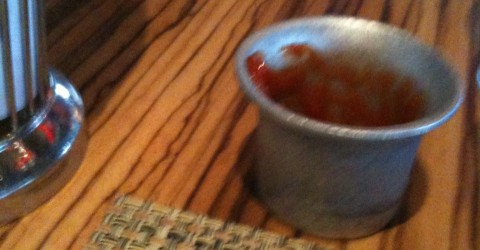






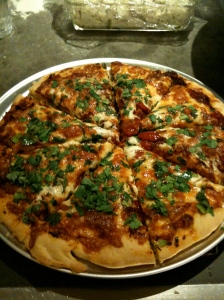
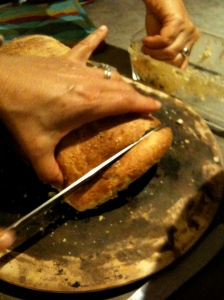
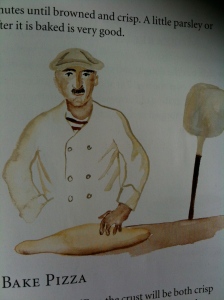
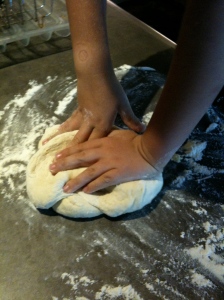
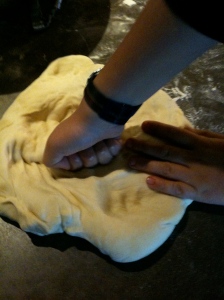
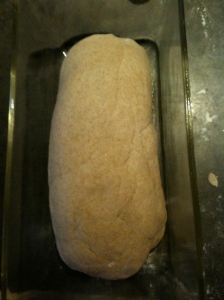
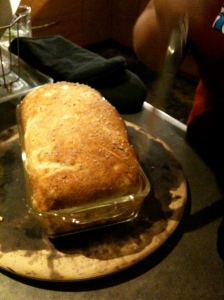
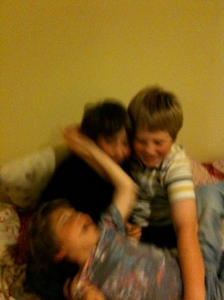
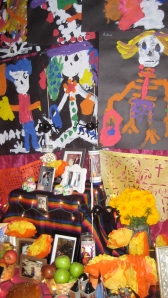
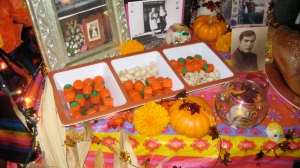
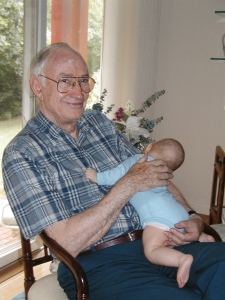
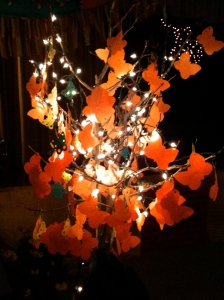
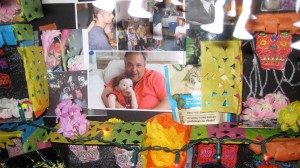
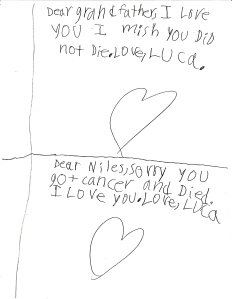
 Then he said he had to count his money first. I have no idea why he had to count his money right then, but it seemed urgent so I waited. He got out his math notebook and his spending jar and now there was money all over the table.
Then he said he had to count his money first. I have no idea why he had to count his money right then, but it seemed urgent so I waited. He got out his math notebook and his spending jar and now there was money all over the table.